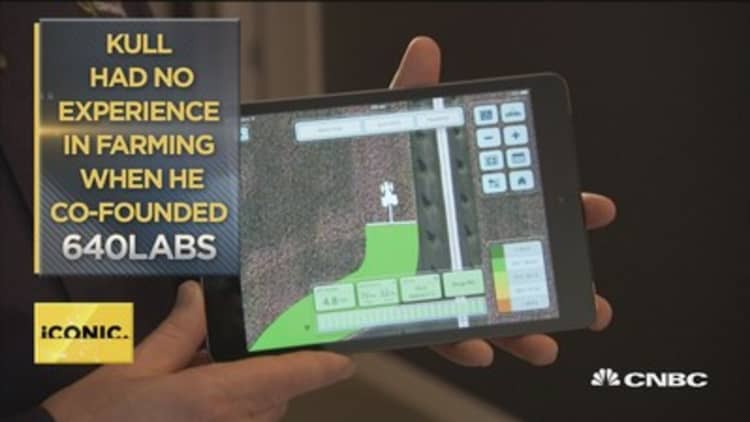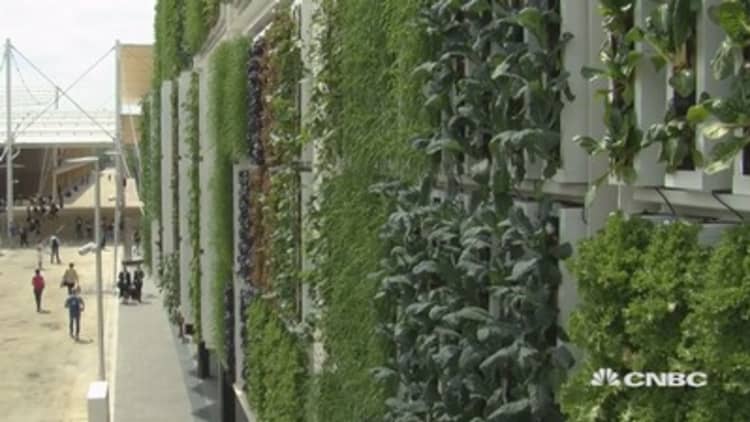
Dire news about drought in the West and avian flu in the Midwest may lead Americans to believe farming is struggling. They'd be wrong. The industry is thriving—and hiring college grads.
A new report finds there's high demand, at least for the foreseeable future, for college graduates with a degree in agricultural programs. An average of nearly 60,000 high-skilled ag and related job openings are expected annually in the United States over the next five years, with only about 35,000 grads in food, ag, renewable resources or the environment graduating each year to fill them, according to data from the U.S. Department of Agriculture and Purdue University. (Tweet This)
Read MoreA house that thumbs its nose at the drought
The study estimates that demand in agriculture and life science-related fields will be strongest for plant scientists, water-resource scientists and engineers, farm animal veterinarians, and precision ag and pest control specialists, among other positions.
"There is a tendency to look at agriculture through a very narrow prism of production agriculture," USDA Secretary Tom Vilsack told CNBC. "It's not just production agriculture now but this is an expanding, entrepreneurial, creative, opportunistic aspect of our economy that I think will continue."
Read MoreOp-Ed: How to fix California's drought problem
According to the report, between 2015 and 2020 an average 26,700 annual jobs openings, or nearly half of the total predicted, will be available in management and business within the food, ag and related segments. Positions will range from ag loan officers, farm labor and marketing specialists to land use managers and sales and service representatives.
"Jobs in ag offer fairly stable kinds of opportunities to maintain careers over time," said Allan Goecker, assistant dean emeritus of Purdue's College of Agriculture and lead author of the report.
People are starting to discover this is a pretty good industry to be in. They realize that this sector isn't our traditional what we joke 'cows, plows and sows' industry anymore. It's incredibly diverse.Mike Gaulcareer services director, Iowa State College of Agriculture and Life Sciences
About 15,500 job openings, or 27 percent of the professional employment opportunities within the food, ag and related space, will be in science, technology, engineering and mathematics disciplines in the next five years. And about 8,500 jobs in sustainable food and biomaterials production will make up an estimated 15 percent of the total, while another 12 percent, or approximately 7,200 job openings, will come from ag and food jobs in other areas such as education, communication and governmental services.
"Agriculture is going through a transformation itself into more of that digital space," said Melissa Harper, vice president of global talent acquisition at Monsanto. "Many of the roles that we need—and those in ag need—didn't exist just five years ago."

Within agriculture and food, about 25 percent of the existing professional workforce is 55 and older—and that means more of those baby boomers will near retirement age and create new opportunities for a steady flow of young people. "We've got a quarter of the population that will be migrating out in the next number of years, so it's important to prepare for that," said DuPont Pioneer President Paul Schickler.
To be sure, there's been some softness in the management and business operations side of agriculture over the last several months amid lower commodity prices and lower farm incomes. It's resulted in layoffs at some of the major farm equipment companies, including Deere. Additionally, some of the poultry companies have curtailed hiring due to the worsening avian influenza outbreak.
Read More'Micro livestock': Edible crickets business booms
But in a sign of ag industry hiring, Iowa State University's College of Agriculture and Life Sciences held its largest job fair ever last October, with about 269 companies attending, up substantially from prior years. The average starting salary for the ag college's 2014 grads was about $48,000—with around half going out at about $50,000, according to Mike Gaul, career services director for Iowa State University's College of Agriculture and Life Sciences.
"People are starting to discover this is a pretty good industry to be in," said Gaul, one of the consultants on the USDA's job study. "They realize that this sector isn't our traditional what we joke 'cows, plows and sows' industry anymore. It's incredibly diverse."


